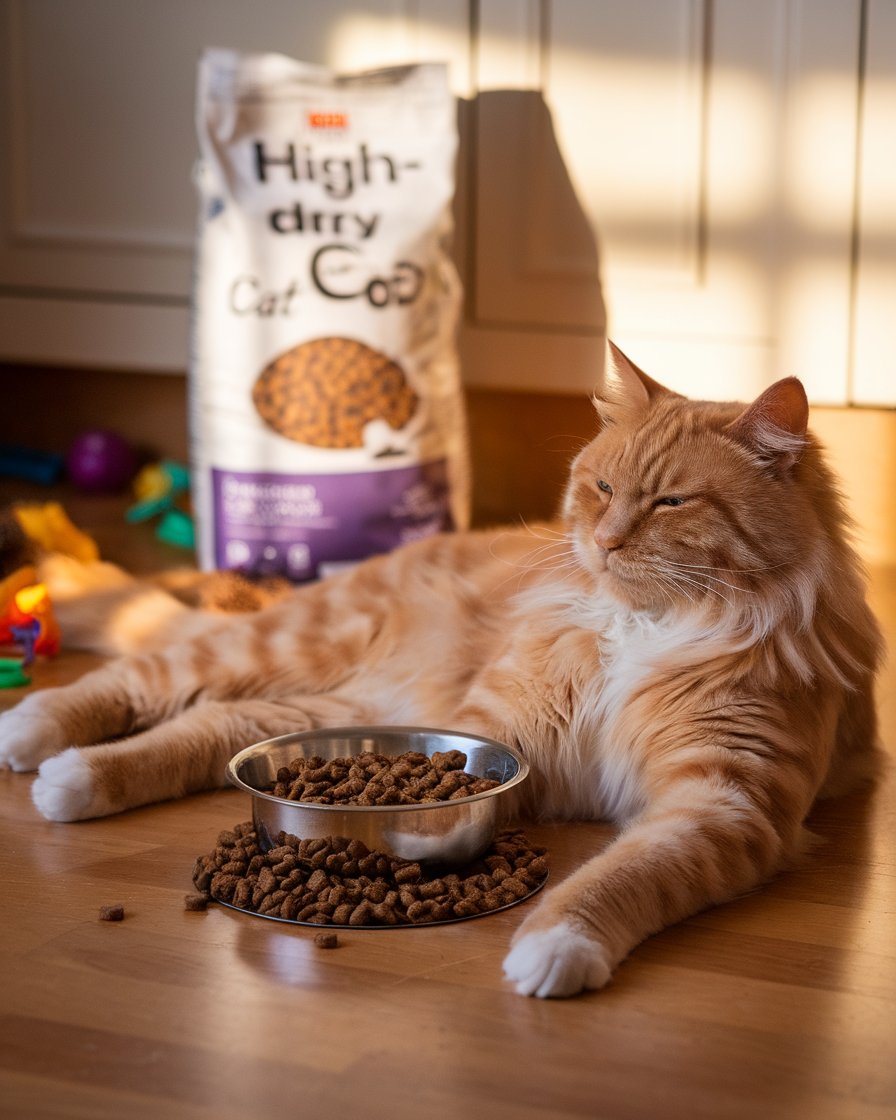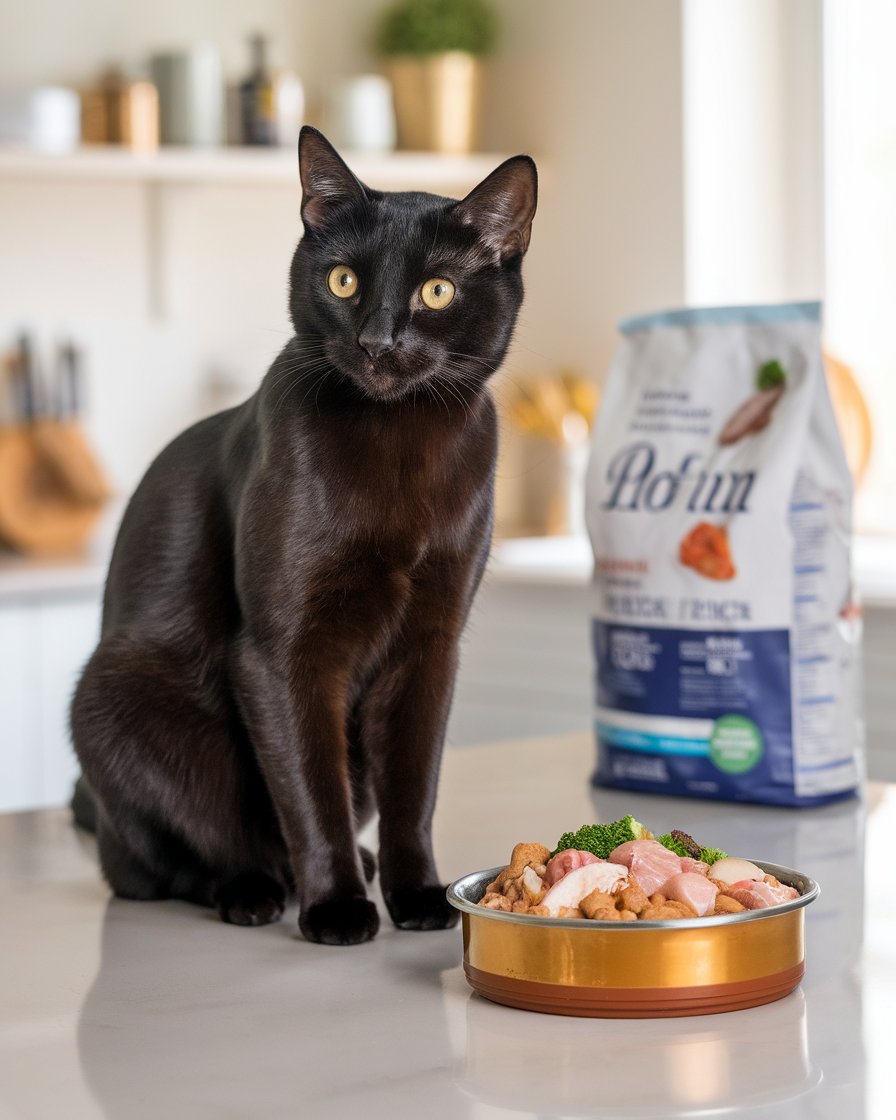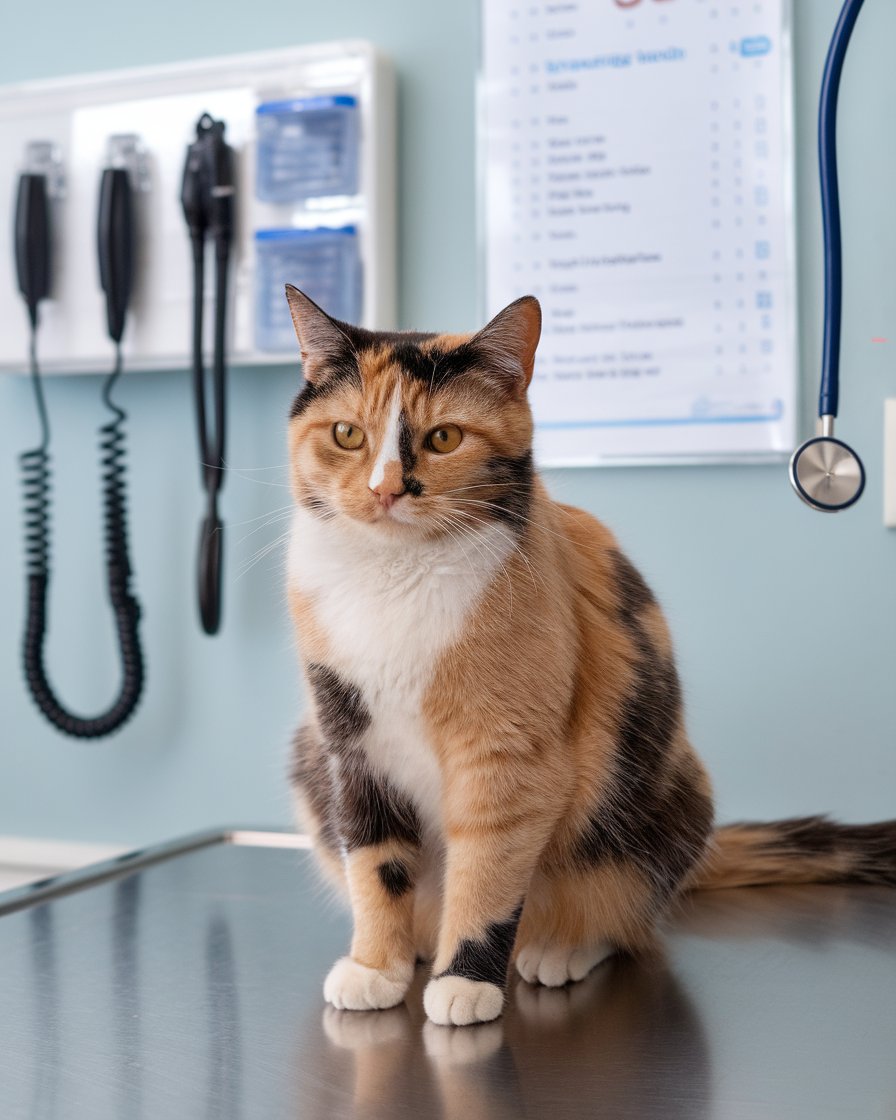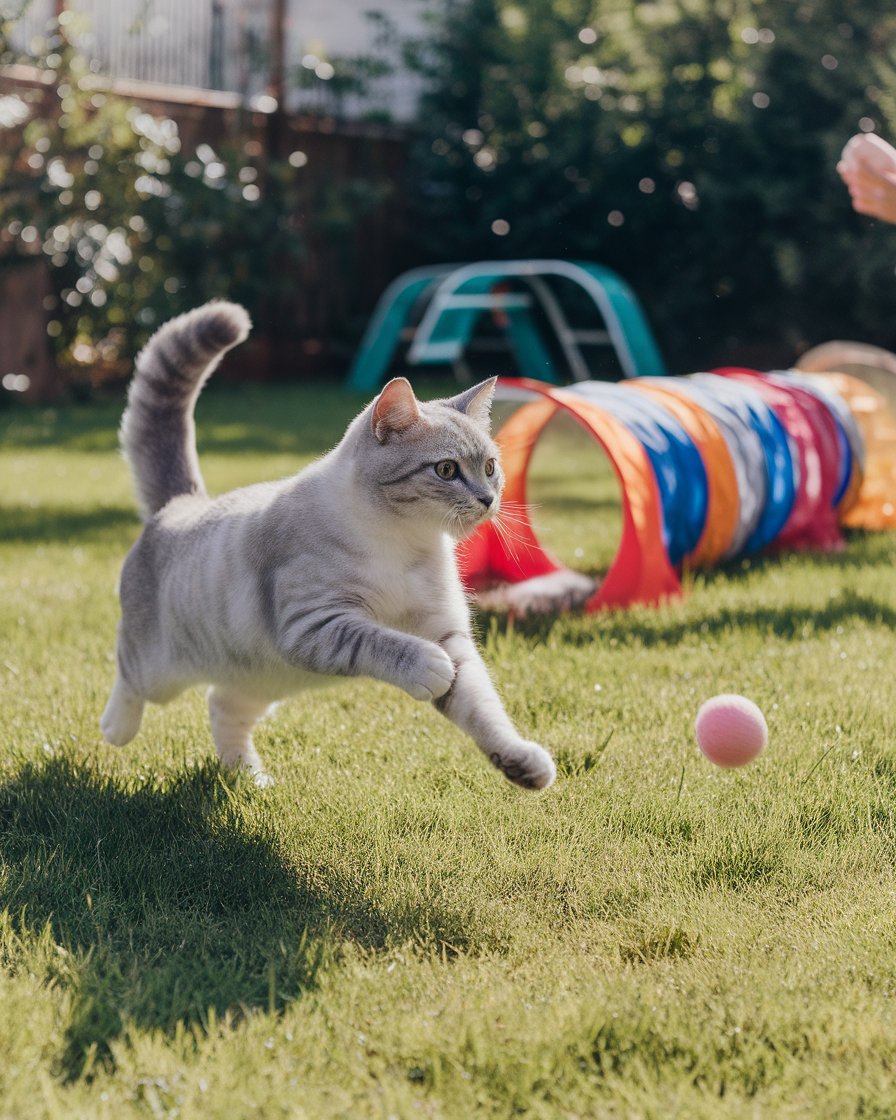- Multivitamin Nutritional Supplement for Dogs & Cats
- Fish Oil, Calcium
- Adult, Senior, Puppy
- Prenatal Cat, Dog Vitamins, 2400 Calories - 16 oz
Introduction
Feline obesity is an increasing concern, with many cats experiencing weight gain due to overfeeding and inactivity. When a cat is fat, it’s not just about appearance—obesity can lead to serious health risks like diabetes, arthritis, and heart disease. Monitoring your cat’s weight and adjusting its diet is essential to prevent these issues. If your cat has gained weight, it may be time to evaluate its feeding routine and exercise habits.
There are several ways to help your cat achieve a healthy weight, starting with proper portion control and more active playtime. Cats, especially big cats, tend to overeat if given free access to food. Ensuring your cat’s food is low in carbs and rich in protein is vital. Regular check-ups with your vet can also help determine whether your cat is at risk and provide insights into different ways to help manage its weight effectively.
Key Takeaways
- Overfeeding and a lack of exercise are the two main causes of feline obesity.
- Obesity in cats can lead to serious health risks such as diabetes, arthritis, and heart disease.
- Ensuring your cat’s food is low in carbohydrates and high in protein helps prevent excessive weight gain.
- Regular exercise and mental stimulation are crucial for managing a cat’s weight, especially for indoor cats.
- Health conditions like hypothyroidism and Cushing’s Syndrome can contribute to weight gain in cats.
- Consulting your vet for proper diet plans, portion control, and regular check-ups is key to helping your cat maintain a healthy weight.
Causes of Feline Obesity

Feline obesity is becoming an increasingly common issue, with many pet owners unaware of the factors contributing to this condition. Cats that consume more calories than they burn, either from overeating or lack of physical activity, are more likely to become overweight. Over time, an overweight cat may experience health problems such as diabetes, arthritis, and even heart disease. It’s important to monitor your cat’s body weight closely and adjust its diet or activity levels as needed to keep it healthy. Feeding your cat smaller meals and ensuring they get enough playtime can help prevent obesity and keep your furry friend in good shape.
Causes of Feline Obesity
Overfeeding and Free-Feeding Habits Many pet owners unintentionally overfeed their cats, particularly when free-feeding is the norm. Leaving food out all day, especially dry food, leads to constant grazing, and this overconsumption of calories is one of the leading causes of feline obesity. Monitoring the portions you give your cat and switching to set mealtimes can significantly help regulate calorie intake.
High-Carbohydrate Diets Commercial dry cat foods often contain high levels of carbohydrates, which can contribute to weight gain. Cats are obligate carnivores, meaning their bodies are designed to metabolize animal protein rather than large amounts of carbs. Switching to a diet rich in high-quality protein and low in carbohydrates can help maintain a healthier weight.
Lack of Physical Activity Indoor cats, in particular, tend to lead sedentary lifestyles with minimal physical activity. Lack of exercise can slow down metabolism and contribute to weight gain. Engaging your cat in regular play sessions using interactive toys or puzzle feeders can help them burn calories and maintain an active lifestyle.
Underlying Health Issues Certain health problems, such as hypothyroidism or Cushing’s syndrome, can cause unexpected weight gain in cats. These conditions slow down metabolism, making it difficult for cats to burn calories effectively. Regular vet check-ups and proper diagnosis are essential for addressing these issues and managing your cat’s weight.
Aging and Metabolism Changes As cats age, their metabolism naturally slows down, and they become less active. This reduction in activity often leads to gradual weight gain. Providing your cat with a balanced diet, along with maintaining regular physical activity, is crucial in managing their weight as they get older.
Overfeeding and Its Consequences
One of the primary causes of feline obesity is overfeeding. Many cat owners leave food out for their pets all day, allowing them to graze whenever they please. This constant access to food, especially calorie-dense dry food, can lead to an overweight cat. When a cat eats more calories than it needs, it starts to store the excess as fat, leading to weight gain. In time, this extra weight may cause insulin resistance and put your cat at risk for diabetes. To help your cat maintain a healthy weight, consider feeding them smaller portions of nutrient-dense wet food, which can be more satisfying without the extra fat.
Lack of Exercise and Weight Gain in Cats
Just like humans, cats need regular physical activity to maintain a healthy weight. Unfortunately, many indoor cats do not get enough exercise. As they age, cats may become less playful and prefer lounging to being active. This lack of movement contributes to the build-up of extra weight. Encouraging playtime with toys like puzzle feeders or interactive games can stimulate your cat mentally and physically, helping them burn calories. Indoor cats are particularly at risk for becoming sedentary, so creating a stimulating environment with cat trees and toys is essential to keep them active and healthy.
Dietary Factors in Cat Obesity

One of the main causes of obesity in cats is an improper diet. Cats are obligate carnivores, which means their bodies are designed to thrive on a diet rich in animal protein. Unfortunately, many commercially available cat foods are filled with carbohydrates and fillers that can contribute to excessive weight gain. When a cat is overweight, it’s more than just an aesthetic issue—it puts them at risk for various health problems like diabetes and joint pain. Ensuring your cat’s diet is nutritionally balanced with a focus on high-quality ingredients can help maintain a healthy weight and overall well-being. Regular check-ups with your vet are also important to monitor your cat’s weight and health.
Case Study: Impact of High-Carbohydrate Diet on Feline Obesity
In a 2018 study conducted by the Journal of Feline Medicine and Surgery, researchers explored the effects of high-carbohydrate diets on overweight domestic cats. The study observed 45 cats over a period of 6 months, where half of the group was fed a commercial dry food diet high in carbohydrates, while the other half received a high-protein, low-carbohydrate diet consisting mainly of wet food. The results showed that the cats on the high-carbohydrate diet gained an average of 12% more weight than those on the high-protein diet. The study concluded that a carbohydrate-heavy diet can significantly contribute to weight gain and obesity in cats, as they are obligate carnivores and rely on protein for energy. Switching to a high-protein, low-carb diet helped the cats reduce fat and maintain lean muscle, demonstrating that dietary adjustments are essential in managing feline obesity.
Importance of Animal Protein in Cat’s Diet
Animal protein plays a critical role in a cat’s diet, especially when it comes to managing their weight. Since cats are obligate carnivores, they rely on protein to fuel their metabolism and maintain lean muscle mass. Without enough protein, a cat is more likely to gain fat and become obese. Many dry cat foods contain high levels of carbohydrates, which can cause weight gain and even lead to obesity if consumed in excess. To ensure your cat stays healthy, look for foods that have a high percentage of meat-based protein. Not only will this help them maintain a healthy body weight, but it will also support their overall well-being.
Managing Carbohydrate Intake for Weight Control
Carbohydrates, while common in many cat foods, are not necessary for a cat’s diet and can contribute to weight gain. Cats have a limited ability to digest and utilize carbohydrates, which can lead to the storage of excess calories as fat. Dry cat foods often contain more carbs than wet food, so it’s important to check the nutritional content when feeding your pet. Limiting carbohydrate intake and offering portion-controlled meals can help manage your cat’s weight. In addition, providing smaller, more frequent meals can prevent overeating and keep your cat feeling satisfied throughout the day. Consulting your vet to design a proper feeding plan is always a good idea.
Health Conditions Contributing to Weight Gain

Certain health conditions can significantly contribute to weight gain in cats, making it challenging for them to maintain a healthy body weight. While overeating and lack of exercise are common factors, underlying medical issues like hormonal imbalances can also play a critical role. These conditions can lead to slow metabolism, increased fat storage, and difficulty losing weight despite dietary changes. It’s important to monitor any sudden changes in your cat’s weight or eating habits, as these may indicate a medical issue that needs veterinary attention. Regular check-ups and early detection can help manage these conditions effectively and keep your cat healthy.
Hypothyroidism and Its Effects on Metabolism
Feline hypothyroidism is one of the primary conditions that can cause a cat to gain weight unexpectedly. This condition occurs when the thyroid gland doesn’t produce enough hormones to regulate metabolism, leading to a slower calorie-burning process. Cats with hypothyroidism may appear lethargic, have a dull coat, and experience constipation. Despite eating normal or even reduced portions, a cat with hypothyroidism can continue gaining weight. Proper diagnosis is essential, and veterinarians typically prescribe hormone replacement therapy to regulate thyroid function. Early detection and treatment can help your cat avoid the risks associated with long-term weight gain and restore their energy levels.
Cushing’s Syndrome and Weight Related Symptoms
Cushing’s Syndrome, caused by an overproduction of cortisol, can also lead to significant weight gain in cats. Cats with this syndrome often display symptoms like increased thirst, frequent urination, and a noticeable belly bulge. The excessive cortisol in their system causes fat to accumulate, especially around the abdomen. Left untreated, Cushing’s can lead to more severe health problems, such as high blood pressure or diabetes. Treatment options vary but often include medications or surgical interventions to lower cortisol levels. Monitoring your cat’s weight and behavior closely can help catch Cushing’s early and improve the likelihood of successful treatment.
“Obesity is a complex condition that has multiple causes, but the solution starts with addressing the root factors like diet and exercise.” – Dr. Ernie Ward, veterinarian and founder of the Association for Pet Obesity Prevention
Strategies for Cat Weight Loss

Helping your cat achieve a healthy weight requires a thoughtful approach. Obesity in cats can lead to numerous health issues, including diabetes, arthritis, and even heart problems. To help your furry friend shed those extra pounds, pet owners must focus on creating a balanced weight loss plan that includes proper nutrition, exercise, and portion control. A combination of these strategies can ensure that your cat not only loses weight but maintains their overall well-being. Consulting with your veterinarian is essential for developing a tailored plan that meets your cat’s individual needs and helps prevent long-term health risks.
Calculating Proper Caloric Intake for Cats
One of the first steps in helping your cat lose weight is determining their ideal caloric intake. This varies based on factors like age, breed, and activity level. For instance, a more active cat will require more calories than a sedentary one. It’s important to avoid feeding your cat based on generic food packaging guidelines, as these can be misleading. Instead, consult your veterinarian to calculate the exact number of calories your cat needs to lose weight gradually and safely. Feeding your cat the right amount of calories will not only promote weight loss but will also ensure they are still receiving the nutrients they need to stay healthy.
Implementing Portion Control and Meal Frequency
Portion control is key when it comes to managing your cat’s weight. Free-feeding, or leaving food out all day, can lead to overeating and gradual weight gain. Instead, measure out your cat’s daily caloric intake and divide it into smaller, controlled portions. Feeding your cat smaller, more frequent meals throughout the day can help prevent overeating and support their metabolism. Additionally, this approach mimics a cat’s natural hunting and eating behavior, keeping them more engaged. Paired with regular exercise and mental stimulation, portion control can be a highly effective strategy for helping your cat lose weight and maintain a healthy lifestyle.
Conclusion
Feline obesity is a growing issue that can lead to many health complications, including diabetes, arthritis, and hyperthyroidism. Ensuring your cat’s weight remains within a healthy range is crucial, especially when underlying health issues like hormonal imbalances can also cause weight gain. Regularly checking to see if you can feel their ribs and monitoring portion sizes can help manage their weight. If your cat is overweight, it’s essential to work on strategies to help them lose weight, such as incorporating more playtime and feeding them low-fat foods.
Consulting a veterinarian is always a good first step, as they can provide insights into how to manage your cat’s weight effectively. Whether your cat has gained 15 pounds or just a little extra fat, adjusting their diet and exercise routine can go a long way. Encouraging healthy eating habits and frequent vet check-ups will help ensure your cat stays healthy and active.

James Dunnington leads the James Dunnington Collection, featuring five unique blogs: a practical Pet Care Guide, an enlightening Ancient History Blog, a resourceful Home Improvement Guide, a cutting-edge Tech Innovation Guide, and a strategic Online Money Making platform. Each site delivers valuable insights designed to empower and inform. For updates and more tips, visit our Contact Us page to sign up for our newsletter, ensuring you never miss out on the latest content from any of these dynamic fields.
